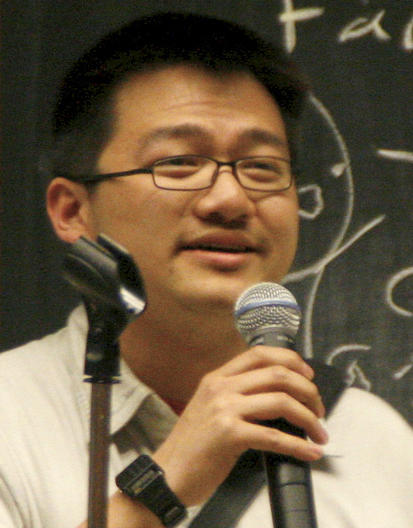
Hacking is largely a practical matter—scratching itches and all that. But, some hackers work in service of irony, manipulating social as well as computer code—to effects that are equally interesting, useful and funny. At this line of work, nobody outdoes Tim Hwang (aka @TimHwang), who blogs as Broseph Stalin (after retiring as commissioner of the US Bureau of Fabulous Bitches) and whose CV also includes creating and organizing all of the following:
ROFLCon (“the most epic Internet culture conference ever assembled”, and it's true).
The Awesome Foundation for the Arts and Sciences (“an ever-growing, worldwide network of people devoted to forwarding the interest of awesomeness in the universe”).
The Web Ecology Project (in which he is also identified as “an analyst with The Barbarian Group”—where he works on issues of group dynamics and Web influence, adding that he “is in the process of watching every homemade flamethrower video on YouTube”, the results of which were presented at SXSW last year).
Robot Robot & Hwang (his future law firm, currently working on “an open-source project to develop the legal infrastructure to allow for large-scale securitizing of lawsuits”).
SOCIALBOTS 2011 (“the first-ever competitive event in the large-scale robotic influence of on-line social groups”).

Tim Hwang
I met Tim when he was a researcher at the Berkman Center and got to know him better through ROFLCon and The Awesome Foundation (in which I now hold a chair in the original Boston chapter). It also seemed like I ran into Tim pretty much everywhere around the MIT-Harvard axis of Cambridge-based social and technical hackery.
I still don't know where Tim went to college, though I'm guessing it was one of the two likely suspects. (Berkman is at Harvard and ROFLCon happens at MIT.) I never asked. From a hacking perspective, where one went to school (or currently goes to school) is not a matter of great importance. This is one of the things that drew me to working with Linux Journal and hanging with hackers in the first place. The hacker ethos is a corollary to a line on a T-shirt I used to see a lot in Los Angeles. It read, “It isn't who you are but how you look. After all, who cares who you are?” Around hackerdom, it's like, “It isn't where you went but what you do. After all, who cares where you went?”
These days, Tim goes to UC-Berkeley, where he's a law student. What he's doing (and presumably will do when he gets out) is work with Robot Robot & Hwang. And, since hacking law is an activity on which at least one of my own open-source projects depends, I'm looking forward to Tim's progress on that front.
Meanwhile, my immediate interest is in SOCIALBOTS 2011, which will be over by the time you read this. The whole “social network” craze drives me up a wall. We've had “social networks” forever, both off-line and on. Bars, restaurants, churches, town squares, marketplaces, cafés, USENET, FidoNet, SMS, blogging—all those things are no less social than Twitter and Facebook, yet when somebody says “social network”, those two things are what they mean. Until I busted them for it, Wikipedia's entry for “social media” read:
Social media have been modernized to reach consumers through the Internet. Social media have become appealing to big and small businesses. Credible brands are utilizing social media to reach customers and to build or maintain reputation. As social media continue to grow, the ability to reach more consumers globally has also increased. Twitter, for example, has expanded its global reach to Japan, Indonesia and Mexico, among others. This means that brands are now able to advertise in multiple languages and therefore reach a broader range of consumers. Social media have become the new “tool” for effective business marketing and sales.
But, while I mocked the pursuit of influence and rankings on Twitter as “high school with a business model”, Tim hacked up a way to prove it, with SOCIALBOTS 2011. The pitch:
Teams will program bots to control user accounts on Twitter in a brutal, two-week, all-out, no-holds-barred battle to influence an unsuspecting cluster of 500 on-line users to do their bidding. Points will be given for connections created by the bots and the social behaviors they are able to elicit among the targets. All code to be made open source under the MIT license.
It's blood sport for Internet social science/network analysis nerds. Winner to be rewarded $500, unending fame and glory, and THE SOCIALBOTS CUP.
I look at this as a way of debugging Twitter, plus every other “social network” (or wannabe) whose executives cringe at the results.
Here's betting that Tim's hack will do more good than a thousand complaints like mine.
Oh, and don't forget to check roflcon.org for details on ROFLCon 3.